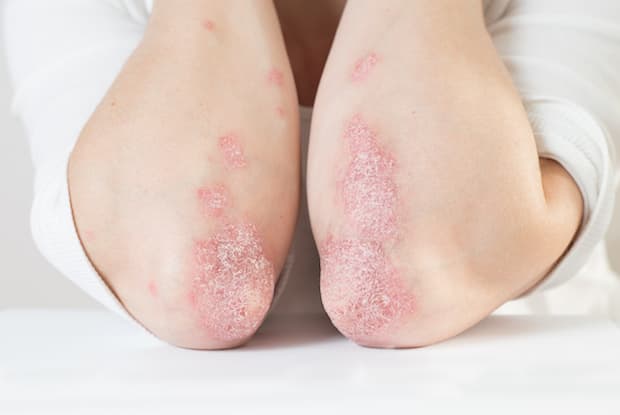Table of Contents
IV. Medicinal baths and creams
Psoriasis overview
Psoriasis is an autoimmune disorder that is characterized by flaky and red skin patches, usually treated with medications like Soriatane. This is a recurring disorder and can cause lots of physical and mental discomfort. Psoriasis occurs due to a problem with the body's T cells, which are white blood cells that are designed to protect the body from infection and disease.

Autoimmune disorders occur when the body mistakenly attacks its systems. In the case of psoriasis, T cells become overly active and set off other immune responses, resulting in skin cells multiplying 10 times faster than usual. This makes the skin build up into bumpy red patches covered with silvery scales. These patches can appear anywhere on the body but most often occur on the scalp, elbow, knees, and lower back. Some common side effects of psoriasis can include:
- Plaques of red skin that are often itchy and painful
- Plaques that sometimes crack and bleed
- Finger and toenail disorders, which can cause the nails to crumble or detach from the nail bed
- Plaques or crust on the scalp
There is no cure for this disease, but there are several medical treatments, including common prescription drugs like Soriatane. Prescription drugs are the first line of treatment, but there are several things you can do at home to help your symptoms as well. Read on to learn more about how to manage your mild to moderate psoriasis symptoms at home. [1]
Managing your lifestyle
Before you implement home remedies into your psoriasis treatment regime, it is crucial to examine any habits or stressors that could be irritating your condition. This disease has many triggers, but stress and certain substances can play a significant role. While managing your psoriasis, it can be beneficial to:
- Avoid alcohol: Alcohol is a common trigger for many of those with psoriasis. Research has not made a direct link between alcohol and psoriasis. One study of 82,869 women over a period of 14 years showed that women who consume 2 or 3 alcoholic beverages a day are more likely to experience the onset of psoriasis. In another study, men who consume over 100 grams of alcohol per day were likely to develop psoriasis or experience worsening symptoms of the disease. Alcohol may cause these effects in psoriasis patients because alcohol can lead to immunosuppression, which makes the body less able to attack pathogens. Consuming alcohol also increases inflammatory cytokines and cell cycle activators, which could cause the skin cells to regenerate excessively. Many medications for psoriasis also interact negatively with alcohol, so avoiding alcohol is a good idea for many psoriasis patients. [2]

- Limit stress: Stress is one of the most common triggers for psoriasis. Flare-ups of psoriasis can also cause stress, so this can be a hard cycle to break. Inflammation is the body’s way of coping with stress. In a typical stress response, the immune system sends out chemicals throughout the body as if to heal a wound. In the case of psoriasis patients, the immune system over-responds to stress and sends out too many chemicals, which can make eliminating the stress even more difficult. If you are experiencing stress-related psoriasis, exercise, meditation, and counseling can help you manage your stress. [3]
- Stop smoking: Many scientists agree that smoking increases a person’s risk of developing psoriasis or exacerbating symptoms of the disease. There are thousands of chemicals in cigarettes, so it is difficult to pinpoint what exactly causes a psoriasis flare-up, but some studies point to nicotine. Nicotine may alter the immune system and skin growth, which can directly affect skin inflammation. One study has found that as many as one in five cases of psoriasis are related to smoking, especially pustular psoriasis. [4]
Diet
Many dietary supplements can help ease psoriasis symptoms. Psoriasis may appear on the skin, but the cause of the disease stems from deep within the body, so you must fuel your system with plenty of healthy nutrients. It is essential to talk with your doctor before taking any herbal medications to avoid dangerous interactions with your medications.
One 2017 study in Dermatologic Therapy found that half of the participants with psoriasis consume less sugar, dairy, and whole-grain fiber than those without the disease. These same participants also noted that reducing their intake of alcohol, gluten tomatoes, potatoes, and peppers led to an improvement in their symptoms. It can be helpful to keep a food journal, so patients can better pinpoint which foods cause flare-ups. [5]
Some foods that may reduce inflammation include:
- Coldwater fish
- Seeds
- Nuts
- Omega-3 fatty acids

It may be beneficial to eliminate the following foods from your diet:
- Red meat
- Saturated fats
- Refined sugars
- Carbohydrates
- Alcohol [6]
Medicinal baths and creams
There are many herbal and natural remedies out there that can help psoriasis patients maintain their symptoms. Luckily, many of these natural substances are cheap and easily accessible at your local grocery store. Read on to learn more about some popular natural remedies.
- Aloe vera: Aloe vera can reduce redness and scaling, which are common symptoms of psoriasis. Look for creams that contain 0.5% aloe. This plant gel can be applied to the skin up to 3 times a day.
- Apple cider vinegar: Apple cider vinegar relieves scalp itchiness. You can dilute the vinegar with water on a one-to-one ratio if the vinegar burns too much. You can apply this vinegar to your scalp several times a week and rinse the skin once the solution has dried to prevent irritation. Try to avoid applying the vinegar to cracked skin.
- Dead sea salts: It can be beneficial to add Epsom salts or Dead Sea salts to your bath to help remove scales and ease itchiness. Soak in the tub with the salts for 15 minutes and apply moisturizer after bathing.
- Capsaicin: Capsaicin is the chemical in chili peppers that make them spicy. Adding capsaicin to creams or ointments can block nerve endings on the skin, which can lessen any pain caused by psoriasis. This chemical may also reduce redness and inflammation, but more research is needed to assess its safety. Capsaicin ointments may cause a burning sensation when applied to the skin.
- Tea tree oil: Tea tree oil is believed to have antiseptic qualities that can help skin conditions. Symptoms of scalp psoriasis can be relieved through the use of tea tree oil shampoo. There is no scientific studies to back the use of this oil with psoriasis.
- Turmeric: Turmeric is said to have powerful anti-inflammatory and antioxidant properties. Curcumin is the active ingredient in turmeric and can help minimize psoriasis and psoriatic arthritis flares. Turmeric can be taken in pill or supplement form.
- Mahonia Aquifolium (Oregon Grape): This is a powerful antimicrobial herb that plays a vital role in the immune response. Improvements to your skin condition can occur if you apply a cream with 10% mahonia. Mahonia is part of the alkaloid family and should only be used topically under doctor supervision. [7]
The content in this article is intended for informational purposes only. This website does not provide medical advice. In all circumstances, you should always seek the advice of your physician and/or other qualified health professionals(s) for drug, medical condition, or treatment advice. The content provided on this website is not a substitute for professional medical advice, diagnosis or treatment.
